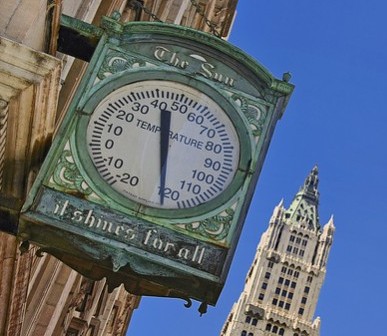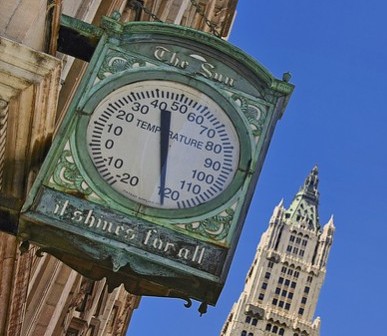 Just another balmy day on the East Coast.Photo courtesy of Tomas Fano via flickr
Just another balmy day on the East Coast.Photo courtesy of Tomas Fano via flickr
The oppressive heat wave gripping the eastern United States, by itself, shouldn’t have any influence on what policymakers think about global warming.
But after the ridiculous spectacle of climate science deniers claiming that last winter’s blizzard disproves global warming, I hope that the record heat we are experiencing now will help focus their minds on the underlying science. A string of recent authoritative reports unequivocally reaffirming the science and rejecting the malicious allegations against climate scientists provides plenty of material to focus on.
Last winter was the perfect storm for climate science deniers. They scoured thousands of stolen emails to cherry pick a handful that appeared to cast doubt on the integrity of climate scientists, a few mistakes were found in the IPCC report on climate change impacts, and a cold and snowy winter blanketed the East Coast. As I said at the time, none of this changed the facts on the ground, in the air, or in the ocean.
That’s true of an isolated heat wave also, but this heat wave is part of a clear trend of increasingly severe and frequent heat. In fact, the last 12 months was the hottest 12 month period on record, and the last decade was the hottest decade on record. As Tom Peterson, Chief Scientist for NOAA’s National Climatic Data Center said recently:
We’re getting a dramatic taste of the kind of weather we are on course to bequeath to our grandchildren.
The record heat of the last few weeks has been matched by a record string of reports reaffirming the underlying science.
Let’s start with the most comprehensive and authoritative. The National Academy of Science released the three primary components of its America’s Climate Choices report in May, addressing the fundamental science, limiting the magnitude, and adapting to the impacts of climate change.
The Acadamy’s conclusions are as definitive as science gets:
Climate change is occurring, is caused largely by human activities, and poses significant risks for — and in many cases is already affecting — a broad range of human and natural systems.
Most of the warming over the last several decades can be attributed to human activities that release carbon dioxide (CO2) and other heat-trapping greenhouse gases (GHGs) into the atmosphere. The burning of fossil fuels — coal, oil, and natural gas — for energy is the single largest human driver of climate change, but agriculture, forest clearing, and certain industrial activities also make significant contributions.
Individually and collectively, these changes pose risks for a wide range of human and environmental systems, including freshwater resources, the coastal environment, ecosystems, agriculture, fisheries, human health, and national security, among others.
Shamefully, this authoritative report has received far less media coverage than the unsubstantiated, and now disproven, allegations against individual climate scientists. Sure, hacked emails and innuendo about wrongdoing are sexier than the solid clear conclusions of an institution such as the National Academy of Sciences. But are they more newsworthy? Journalists have a responsibility to evaluate the meaning and significance of allegations before spreading them. In the case of the so-called “climate gate” episode they mostly failed at that responsibility.
Now journalists have an opportunity to set the record straight, as Media Matters, NRDC, and others urged them to do yesterday. The Project on Climate Science summarized the conclusion of the latest report, which also came out yesterday, to find baseless the allegations arising from the hacked emails:
The Independent Climate Change E-mails Review, also known as the Muir Russell report, declared today that it “did not find any evidence of behaviour that might undermine the conclusions of the IPCC assessments.” Regarding the actions of the scientists of the Climate Research Unit of the University of East Anglia, the report stated that “their rigour and honesty as scientists are not in doubt.”
This report is the last in a series of three investigations in the United Kingdom into the alleged wrong-doing by climate scientists. It also comes on the heels of the exoneration of Professor Michael Mann from investigations at Penn State University.
Here are three additional examples as summarized in the Media Matters letter:
Responding to allegations that Dr. Michael Mann tampered with scientific evidence, Pennsylvania State University conducted a thorough investigation. It concluded, “The Investigatory Committee, after careful review of all available evidence, determined that there is no substance to the allegation against Dr. Michael E. Mann, Professor, Department of Meteorology, The Pennsylvania State University. More specifically, the Investigatory Committee determined that Dr. Michael E. Mann did not engage in, nor did he participate in, directly or indirectly, any actions that seriously deviated from accepted practices within the academic community for proposing, conducting, or reporting research, or other scholarly activities.”
London’s Sunday Times retracted its story, echoed by dozens of outlets, that the IPCC issued an unsubstantiated report claiming 40 percent of the Amazon rainforest was endangered due to changing rainfall patterns. The Times wrote, “In fact, the IPCC’s Amazon statement is supported by peer-reviewed scientific evidence. In the case of the WWF (World Wildlife Fund) report, the figure had, in error, not been referenced, but was based on research by the respected Amazon Environmental Research Institute (IPAM) which did relate to the impact of climate change.”
After analyzing 32 summary conclusions on the regional impacts of climate change in the IPCC’s 2007 Fourth Assessment Report, the Netherlands Environmental Assessment Agency concluded that “no significant errors” had been made.
This swarm of data and reports should close this chapter in the long-running saga written by the Merchants of Doubt. Ideologically-driven climate science deniers will doubtless come up with new arguments, but next time let’s hope that the media won’t go along for the ride.



